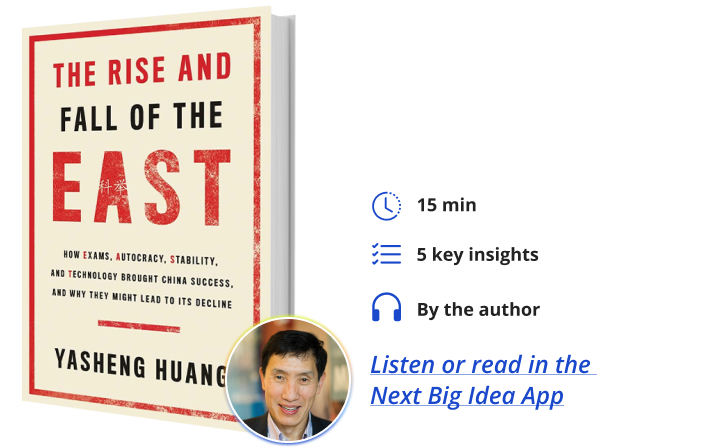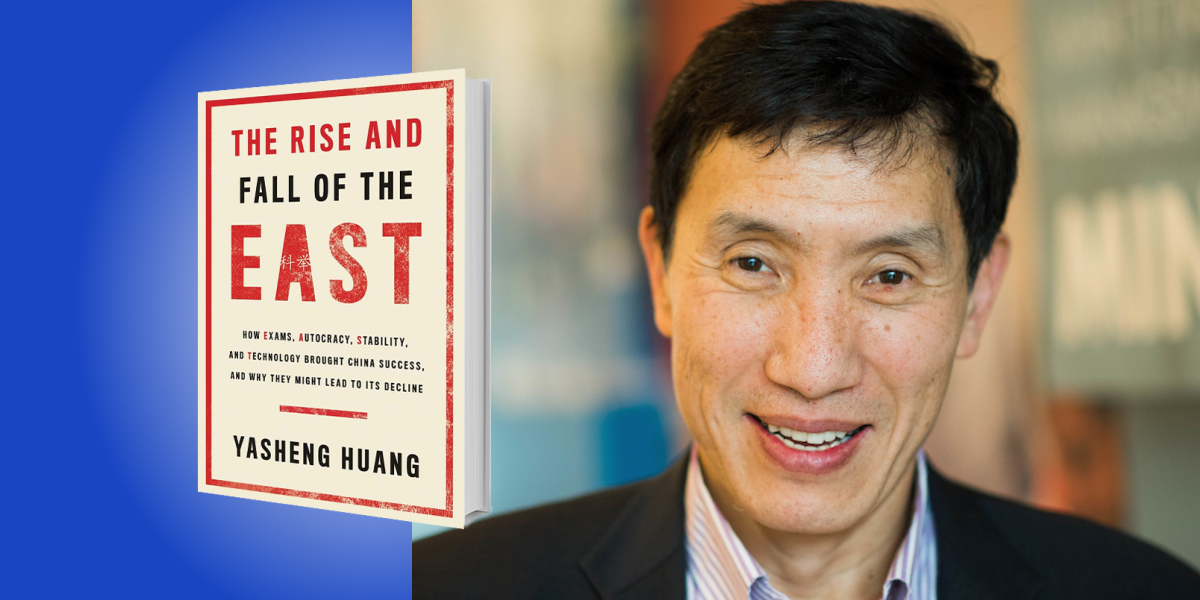Yasheng Huang is a professor of Global Economics and Management at MIT, where he founded and heads the China Lab and the India Lab.
Below, Yasheng shares five key insights from his new book, The Rise and Fall of the EAST: How Exams, Autocracy, Stability, and Technology Brought China Success, and Why They Might Lead to Its Decline. Listen to the audio version—read by Yasheng himself—in the Next Big Idea App.

1. The durability of the Chinese communist regime.
China is only one of the five remaining communist countries in the world. On October 1st, 2023, China will celebrate the seventy-fourth anniversary of its founding, superseding the life span of the first communist country in history, the Soviet Union. That, of course, presupposes that the Chinese Communist Party does not collapse before then, fulfilling a prediction made by a long line of Western observers—most famously by Gordon Chang. His book, The Coming Collapse of China, was published in 2001. Twenty years later, it seems that “coming” is a relative concept.
To put it mildly, the Chinese regime has gone through a lot, but it has survived to tell us about it. It has withheld shocks of catastrophic enormity, such as the Great Leap Forward, the Cultural Revolution, and the 1989 Tiananmen crackdown. It has successfully pushed back against the liberalizing effects of a growing middle class, globalization, private sector influences, and the rising living standard, defying the expectation that economic development would lead to the democratization of the country. Against all odds, the Chinese Communist Party has firmly held power. Today, it has 96 million members. If it were a country, it would rank 16th largest in the world.
I trace the staying power of the Chinese regime to an institution established in 6th century: the civil service exam. This is the first letter of the EAST formulation in the title of my book. For 1,500 years, this civil service exam system, known in Chinese as Keju, drilled Chinese minds in autocratic values and deference. It also wiped out any competing forces with the state, such as aristocracy, bourgeoisie, independent intelligentsia, and church—such forces that in other societies check and balance the state. China is a state without a society.
2. Why are so many economic success stories East Asian?
If you tally up successful economies that took off in recent history, many of them are East Asian. First Japan, which modernized as early as the 19th century, then South Korea, Taiwan, and Hong Kong. Since 1978, Chinese economic growth has averaged around 10 percent a year.
The first letter in the EAST formulation, the institution that drilled autocratic values into the Chinese people, also contributed to East Asia’s stellar economic growth. The Keju system originated in China and spread to the rest of East Asia. Everywhere it went, Keju incubated and fostered literacy, numeracy, and work ethics.
“Since 1978, Chinese economic growth has averaged around 10 percent a year.”
Keju is all about memorization. To pass the highest level of Keju a candidate might need to commit between 300,000 and 400,000 characters to memory. We know that just having the right policies and institutions is not enough; “a culture of growth” is also needed for economic development. Keju bequeathed this culture of growth and then East Asia took off under the right conditions—such as peace, stability, and pro-growth policies.
3. China was once the most technologically advanced civilization in the world.
Ancient Chinese achievements in technology are staggering. China led Europe in metallurgy, ship construction, navigation techniques, and many other fields, often by several centuries. The Chinese also invented gunpowder, paper, water clock, moveable printing press, and other consequential technologies way ahead of the West. For example, the Chinese invented seismograph 1,700 years before the French.
But suddenly and mysteriously, China’s technological development stalled, stagnated, and eventually collapsed. The fate of Chinese technology is one of the deepest mysteries in historical studies. It is the last letter of the EAST formulation, T for technology. Keju weaponized Chinese autocracy and prolonged the stability of the Chinese imperial system. (Autocracy and Stability are the middle two letters in my EAST formulation.) Keju decimated the diversity of ideas and vaulted Confucianism at the expense of other great ideologies of ancient China, such as Daoism and Buddhism. This was a boon to the emperors but a catastrophe for human creativity.
Creativity thrived in an environment of competition and diversity of ideas, and it atrophied as China transitioned to an extreme autocracy. China missed the boat of the Industrial Revolution not because Chinese people were not smart and hardworking, but because Europe had something that China sorely lacked: economic competition, ideological rivalries, and political diversity. This is a sobering lesson from China’s history.
4. The Chinese system is stable, until it is not.
The Chinese Communist Party is strong because it can draw from the wisdom of thousands of years of Chinese statecraft (including Keju) which the Chinese state has adapted and improved upon. This is true, except in one area: how to transfer power from one leader to another. The imperial system was highly scripted and rule-based—the throne went to the eldest son of the emperor. No question. The clarity of the system prevented squabbles for power and preserved the stability of power transitions.
Communism is a republican form of government and, aside from North Korea, it does not practice hereditary succession. Without elections, the legitimacy of a leader does not travel easily from one person to another. This is the Achilles Heel of a Communist regime. The Chinese Communist Party must come up with its own solutions without tapping into the knowledge, norms, and wisdom of its imperial predecessors. This is its vulnerability.
The record of the Chinese Communist Party successfully engineering power transition is a blemished one. Deng Xiaoping sacked two of his own successors. So did Mao Zedong. In fact, one of Mao’s designated successors attempted to assassinate him. After his death, his wife and her supporters were summarily arrested, and the leader Mao installed was cast aside.
“The catch of successions in an autocracy is that autocratic power and autocratic stability can correlate inversely.”
By Chinese standards, Xi Jinping’s own ascension to power was smooth, but that was because the Chinese Communist Party had instituted term limits and mandatory age requirements. Xi has abolished the term limits and weakened the mandatory age requirements. While these moves have made him very strong (possibly the strongest leader since the days of Mao Zedong) they have also accentuated uncertainties about succession. The catch of successions in an autocracy is that autocratic power and autocratic stability can correlate inversely. The power of an autocrat makes everybody else powerless, including his successor. This is why so many succession arrangements have gone awry in China and other Communist countries.
5. Would China ever become a democracy?
The prospect of China becoming a democracy looks dimmer by the day. We often think about democracy as coming from the demands of the citizens who rise in rebellions against oppressive dictators. A more likely path of democratization comes from elites within the political system. In the 20th century, two-thirds of regime changes in authoritarian countries were the result of rebellions by political insiders. Democracy can be in the interest of the Chinese elites, but that argument has to appeal to the self-interest of the Chinese elites rather than to their ideals.
In an autocracy, elites command massive power and privileges and, understandably, many believe that elites want to preserve the status quo. But there is a saying in China, “Keeping company with a king is like keeping company with a tiger.” The history of the Chinese Communist Party is saddled with tales of once powerful and privileged elites being tossed aside as politics shifted. A former president of China was persecuted to death and was buried under a fake name. Another leader, the general secretary of the Chinese Communist Party, spent 15 years under house arrest.
I used John Rawls’ famous thought experiment known as the “veil of ignorance” to appeal to the Chinese elites: “If you do not know the probability distribution of ending up on the Politburo or in a jail cell, would you favor democracy over autocracy? Would you favor a system that protects universal rights, including rights of yours when you are being knocked out and purged from power?” I compare democracy to an insurance policy. When things go well, you do not need it, but when things go badly, you would appreciate having it.
When the marauding Red Guards dragged him out in a struggle session, Liu Shaoqi, China’s former president and once Mao’s designated successor, waved a copy of the Chinese Constitution and protested that he had rights. I believe that at that very moment, he might have had a reckoning with the value of democracy. I hope that other Chinese elites will understand before it is too late.
To listen to the audio version read by author Yasheng Huang, download the Next Big Idea App today:































